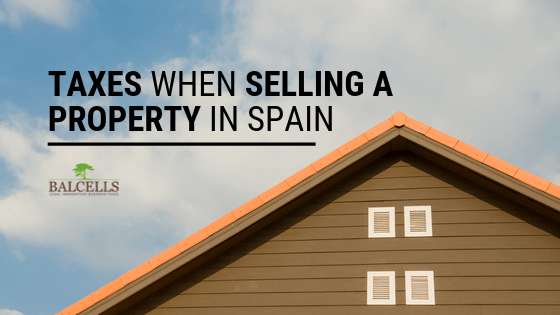Are you considering selling your house? Then you should read this article. Because knowing the exact costs and taxes when selling a property in Spain is really important. It can save you money and let you enjoy all the tax liabilities you are entitled to. They say that failing to plan is planning to fail. And with such a real estate transaction, that sentence couldn’t be truer.
Content of the article:
Why it’s so important to know how much it costs to sell a property in Spain
Let’s suppose you start considering selling your property. What you will immediately do is find out how much can you get out of it.
You will do some research and calculations, and you will end up finding what you expect to earn. That is the minimum amount you will be willing to accept.
But if you fail to determine the exact costs and taxes you will pay for the transaction… that minimum amount will become lower. So you will be losing money.
Why? Because of the price you get from the buyer, you need to subtract all those costs and taxes. So it is completely essential to take those numbers into consideration.
Furthermore, planning in advance will help you enjoy all the tax benefits you are entitled to. There may be several tax optimization tactics you could benefit from. But, of course, you need to know them.
So, before signing any document and even before considering selling your property… make sure to ask for legal advice and visit a specialized real estate lawyer.
What she will tell you might make you decide whether to sell or not.
But let’s move on to the important part.
The two taxes you will pay when selling your property
Basically, there are two main categories of taxes you will pay when selling your Spanish property:
“Plusvalía” or added value
The plusvalía is a small tax you will need to pay to the local town hall in which the property is located and sold.
The exact amount is variable, and it depends on the 3 following factors:
- The number of years you’ve been the owner of the property
- Where exactly is the house or flat located inside the municipality
- Square meters
Usually, it will represent a tiny fraction of the value of the house/flat. Nevertheless, if you have owned the property for many years, it can be thousands of euros.
Why does plusvalía exist?
The answer is simple.
This tax tries to capture part of the increasing value of the location in which the property is located.
Let’s say you bought the property at price X. Nevertheless, as the years pass, the government has been implementing several improvements in the surroundings (new infrastructures, schools, etc.). These improvements revalue the area, so you can now sell the property at a higher price due to that new environment.
Plusvalía tries to capture part of that increase in profits due to the improvements carried by the town hall.
How to know how much added value you will end up paying?
In order to know the exact amount, you have two options:
- Ask your solicitor and she/he will tell you.
- Go to the town hall and ask for the value of the property.
Capital Gains Tax
Let’s now move to the main tax when selling your house: the capital gains tax.
This is where the vast majority of the selling costs will come from.
The exact percentage will depend on whether you are a resident or not, and on the number of years you’ve been the owner; ranging from 19 to 23%.
Not being a resident in Spain (but being resident in any other EU country) will make you pay just 19%.
You can learn more about the capital gains tax in this article.
How can I avoid paying capital gains tax when selling my property?
Paying 20% of your earnings when selling your house can be really painful.
And then is when you start asking yourself: is there any way to avoid that payment?
Well, in fact, there is.
There are several ways in which you can reduce the total percentage (which is really good); and some situations that exempt you completely from paying it.
First of all, deductions. You can deduct the agency commission and the energy certificate paid via invoice from your capital gains tax payment.
Then, two exemptions.
If you are over 65 years old and have lived in the house you are selling for (at least) the past 3 years, you don’t need to pay this tux.
Finally, if you are a Spanish resident, you can benefit from the main home exemption. It simply means that if the property you sell was your habitual residence and will reinvest the earned money in your new home, you don’t need to pay this tax either.
Additional costs when selling your house in Spain
Apart from the two beforementioned taxes, there are several other costs you will bear. Basically we are talking about:
- Agency commission. This is the commission percentage you agree with the real estate agent. In Spain, they usually charge around 5%.
- Income tax provision. If you are a non-resident, you will be facing a 3% retention of the selling price. This amount goes directly to the Spanish Tax Office.
- Energy certificate. Issued by an architect or technical house engineer. It will vary depending on the square meters of your house but expect something between 100 and 500€.
Is it really worth bearing the cost of the real estate agent?
Many expats rely on a real estate agent in order to sell their Spanish property. But there are other options that could end up being the most cost-effective.
What you need to understand is the role of the estate agent and what they will do for you.
They will include the details of your property on their office window, put signs on the street, send emails to their database, arrange meetings with the potential buyers, and provide their knowledge.
Of course, that can seem like quite a lot. Indeed, not using an agent can set yourself up to fail.
But there is an important downside: you will only be gaining local exposure with them. The real estate agent has an important influence on the surroundings, but the reach is limited.
The alternative: online platforms
What if there is a potential buyer located abroad? You won’t be able to let her find you.
That is when the alternative comes into play: relying on online platforms.
There are tons of online websites, like Fotocasa or Idealista, in which you can list your property and gain a really wide reach. This presents two important benefits in comparison to the real estate agent:
- The commission will be much lower, so you will save money there.
- Your chances of finding a buyer, and finding her fast, will increase dramatically.
So make sure to really understand which cost do you prefer paying: the agent commission or the platform cost.
Do you need legal assistance?
If you think you need a specialized team of lawyers helping you out with the selling process…
We are here for you!
We will manage all the paperwork and help you optimize your taxes/costs so you earn as much as possible from the transaction!
Book a consultation with one of our lawyers and solve all your doubts:



